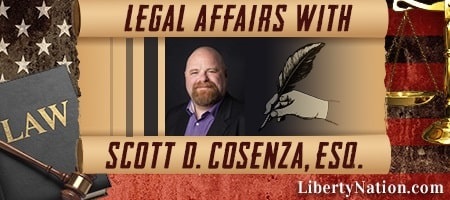The Virginia Institute for Public Policy (VIPP)* will have its day in court Friday afternoon, Oct 29. The organization advocates for individual liberty and “constitutionally-limited government,” and that’s what this case concerns. As Liberty Nation has reported, the injunction complaint asks the Circuit Court for Fairfax County to order election officials to require certain absentee ballot applicants to verify their identity. Now we have the county’s reply, which claims the law doesn’t mean what it says.
 Scott O. Konopasek is the Director of the Office of Elections and the General Registrar for Fairfax County. It’s his job to only hand out absentee ballots to those authorized to get them under state law. This controversy concerns ballots that are not requested in person but remotely, for instance, online. Because these applications are more fraud-prone, the state requires verification with a partial Social Security number. Not so, says Konopasek. Instead, he claims the SS# requirement is optional at the registrar’s discretion.
Scott O. Konopasek is the Director of the Office of Elections and the General Registrar for Fairfax County. It’s his job to only hand out absentee ballots to those authorized to get them under state law. This controversy concerns ballots that are not requested in person but remotely, for instance, online. Because these applications are more fraud-prone, the state requires verification with a partial Social Security number. Not so, says Konopasek. Instead, he claims the SS# requirement is optional at the registrar’s discretion.
You Can’t Sue Anyway
Before addressing the principal argument in the complaint, the registrar argues the Institute lacks standing, or rightful ability to file the suit, because it is a corporation, not a human Virginia voter. In response, VIPP argues several counterpoints, including that the action it brings is allowed under the Anti-Suspension clause of the Virginia Bill of Rights, and that this clause is what controls the issue, not election law. It reads: “That all power of suspending laws, or the execution of laws, by any authority, without consent of the representatives of the people, is injurious to their rights, and ought not to be exercised.”
Getting to the merits of the issue, according to VIPP, the relevant portion of Virginia law says:
“Applications for absentee ballots shall contain the following information:
-
The applicant’s printed name and the last four digits of the applicant’s social security number.”
That’s Virginia state law § 24.2-701, titled, “Application for absentee ballot.” It seems plain enough. Not according to Mr. Konopasek. He argues a different part of the law gives the registrar discretion over what is “material” when determining whether to issue an applicant an absentee ballot. According to the brief Konopasek’s attorney filed, the above-captioned law has no teeth, is unenforceable, and prescribes no course of conduct for registrars dealing with remote absentee ballot applicants.
What Should They Have Written?

(Photo by: Education Images/Universal Images Group via Getty Images)
LN asked Mr. Konopasek’s attorney what kind of law would need to be written to ensure verification with partial Social Security numbers was required for some absentee ballot applicants if this one doesn’t. He did not respond by our publication deadline to that question or whether he knew if any of Virginia’s 136 independent cities and counties treated the issue as Fairfax County and Mr. Konopasek do.
Lauren Bowman, spokeswoman for the Public Interest Legal Foundation (PILF), told LN in an exclusive interview that Fairfax County is the only Virginia jurisdiction they know of dismissing the Social Security number verification. PILF uses litigation to protect the right to vote and “preserve the Constitutional framework of American elections through litigation, investigation, research, and education.” LN asked about what an ideal order would contain from Fairfax County Circuit Court Judge Michael F. Devine: “What’s the best possible outcome for Virginia voters here?” Bowman replied:
“The best possible outcome is this will force Fairfax County to follow the law and to collect the missing social security numbers. This information allows election officials to know that ballots are being sent to the correct people. When ballots are sent to the wrong people, it can result in the disenfranchisement of other voters. Election rules and procedures exist for a reason, and they must be followed.”
Reports indicate at least hundreds of ballots have been sent out without the verification a plain reading of the law suggests is required. This is amidst a hotly contested gubernatorial race for which hundreds of votes could be the margin of victory. Ms. Bowman said they expected the judge to issue his ruling on the motion Friday.



